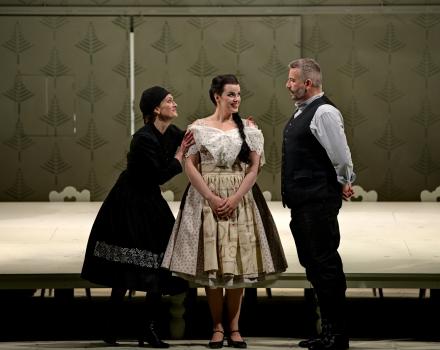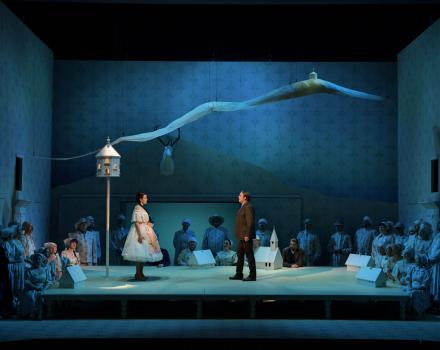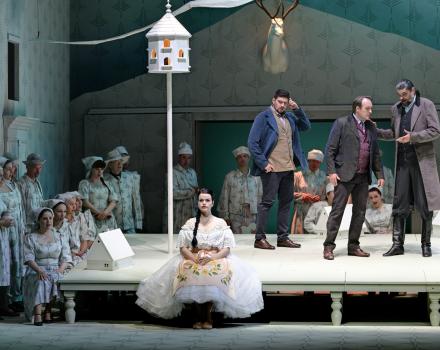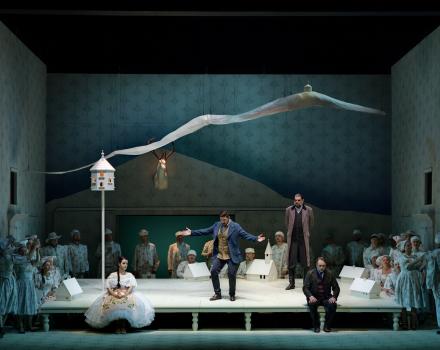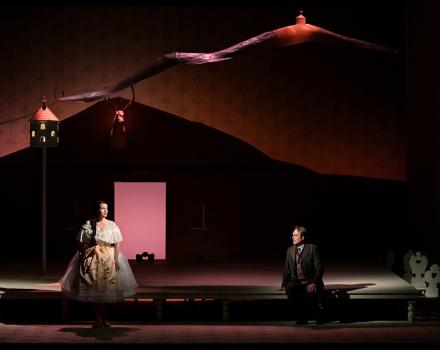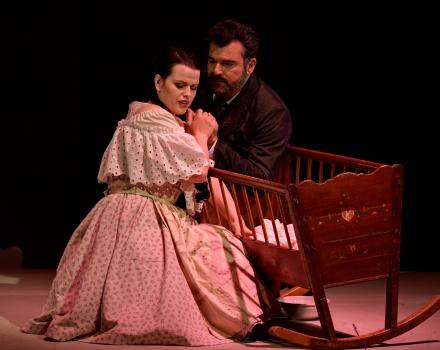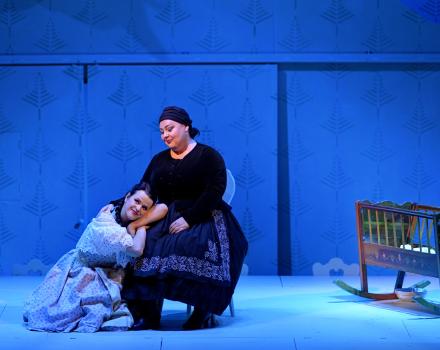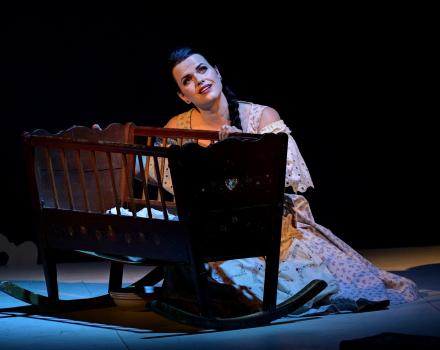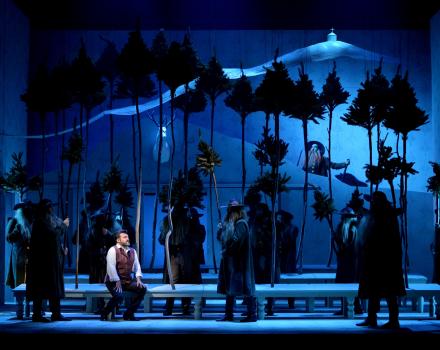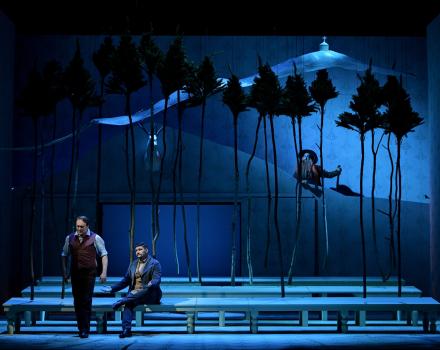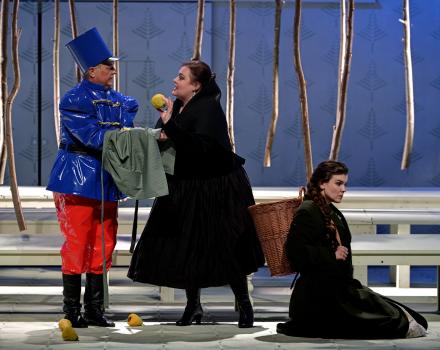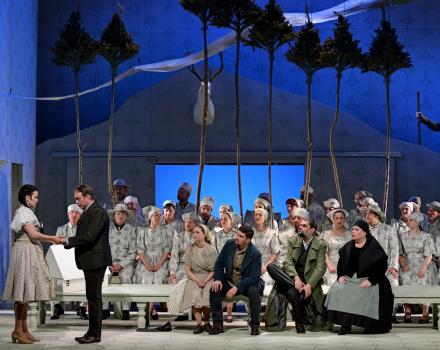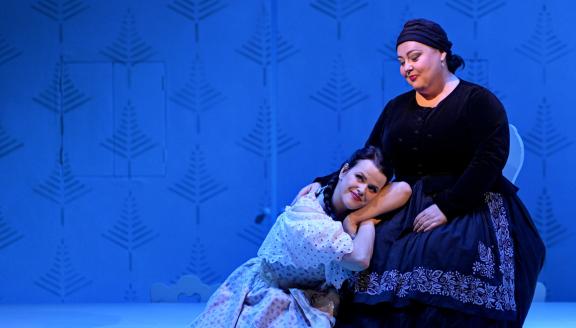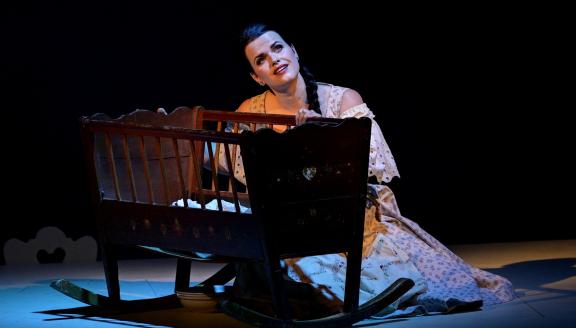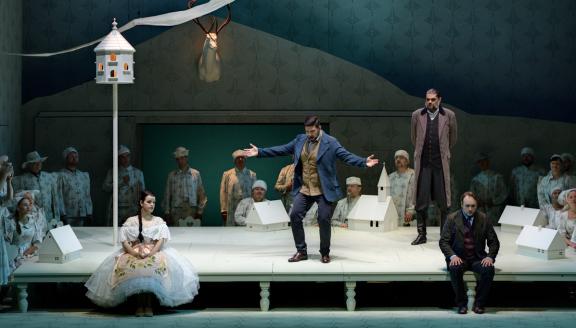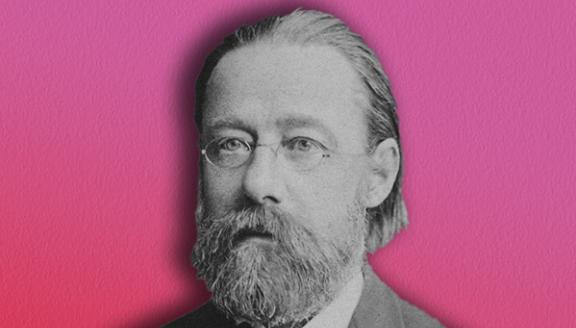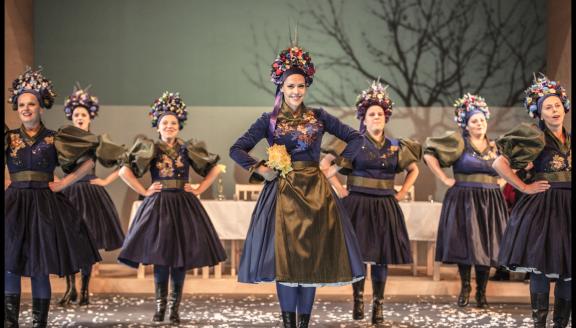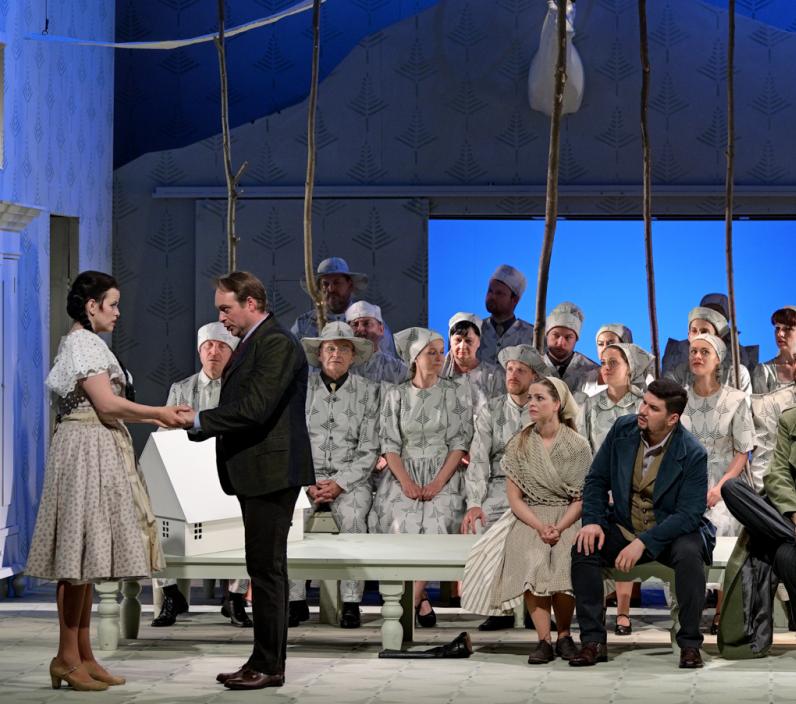
The Kiss

A twist of fate offers the young widower Lukáš and his former lover Vendulka a second chance at the happiness once denied them. However, their short tempers, stubborn natures and lack of mutual understanding leave the lovers vulnerable to a serious quarrel all on account of a mere kiss.
The Kiss holds a unique place in Smetana’s oeuvre; it was the first operatic work he composed after the great personal tragedy of completely losing his hearing. Eliška Krásnohorská adapted a short story by Czech realistic writer Karolina Světlá for the composer, setting it to rhyming verses and creating one of the best librettos he ever received. A seemingly banal story - with almost no dramatic potential - belies deep emotional and psychological depth, and Smetana turned it into a brilliant opera filled with an exquisite musical characterisation of picturesque figures, rural traditions and superstitions. First and foremost, he created a heartfelt image of the pure souls of ‘simple’ folk. The production was staged as an integral part of the Smetana Opera Cycle Ostrava 2024 by director and National Moravian-Silesian Theatre’s Intendant Jiří Nekvasil and Music Director of Opera Marek Šedivý.
CAST
Father Paloucký | František Zahradníček |
|---|---|
Vendulka | Veronika Rovná |
Lukáš | Martin Šrejma |
Tomeš | Jiří Rajniš |
Martinka | Lucie Hilscherová |
Barče | Marta Chila Reichelová |
Matouš | Josef Kovačič |
The Border Guard | Václav Morys |
Morningstar | Stela Machová Nela Starková |
Orchestra | National Moravian‐Silesian Opera Orchestra |
Chorus | National Moravian‐Silesian Opera Chorus |
| ... | |
Music | Bedřich Smetana |
|---|---|
Text | Eliška Krásnohorská (based on the short story by Karolína Světlá) |
Conductor | Marek Šedivý |
Director | Jiří Nekvasil |
Sets | Jakub Kopecký |
Costumes | Simona Rybáková |
Movement director | Jana Tomsová |
Chorus Master | Jurij Galatenko |
Dramaturg | Juraj Bajús |
| ... | |
Video
STORY
Act I
The Krkonoše Mountains. Years ago, a young man named Lukáš was forced by his parents to marry a woman he did not love. Now a widower, he courts Vendulka, his first true love. Vendulka’s father gives them his blessing but warns Lukáš that their marriage will not be a happy one as they are both equally stubborn and quick-tempered. Lukáš cannot imagine ever being in an argument with Vendulka. However, when Vendulka’s father presents the bride to Lukáš, they immediately argue over a kiss. Vendulka does not wish to kiss Lukáš before marriage for fear of upsetting his deceased wife. The argument continues even after everyone leaves the ceremony. After an angry outburst, Lukáš goes to a pub where he collects a group of girls and musicians and leads them to Vendulka’s father’s house. There, under her window, they all dance and rage, making fun of her. Vendulka feels embarrassed and flees her father’s home. She runs to her old aunt, Martinka, and decides she would do anything not to be around Lukáš - even to the point of going into the woods at night to be a carrier for smugglers.
Act II
The forest near the border. Chief smuggler Matouš leads his gang through the woods at night and they walk in all directions. Matouš awaits his carrier Martinka and hears Lukáš, who is feeling bad about his behaviour and is wandering through the dark woods, confused. Lukáš cries on the shoulder of his brother-in-law Tomeš, who has followed him to make sure he does not hurt himself in desperation. Tomeš advises him to invite a few virtuous neighbours as witnesses first thing in the morning to beg Vendulka for forgiveness. Lukáš in better spirits leaves with Tomeš. Martinka approaches Matouš to pick up his smuggled goods. He notices the nervous Vendulka alongside her and realises that she is only there with Martinka to hide. Since he feels sympathy for Lukáš, he decides to tell him where she is and lead him there. Martinka tries to persuade Vendulka to reconcile with Lukáš but she is as angry as before.
Martinka’s cottage. In the morning, when Martinka and Vendulka come home to their cottage, they see Lukáš with the neighbours waiting for them. Vendulka is so touched by his visit that she runs to him lovingly and wants to give him a kiss of reconciliation. However, he does not want to accept the kiss, not until he has asked for her forgiveness. Finally, they kiss each other passionately; there ends their argument and opera.
Insights
In 1871, the short story Hubička (The Kiss) by Karolína Světlá with the subtitle A Humorous Story from the Lives of our People from the Mountains was published in the monthly magazine Osvěta. The idea to adapt The Kiss for Smetana as an opera libretto came from Eliška Krásnohorská. Smetana’s deafness made it impossible for her to talk to the composer in person, but paradoxically, the musician’s misfortune became a blessing for history. There is a surviving correspondence about the collaboration between the librettist and the composer.Although Krásnohorská destroyed many of the letters, the correspondence provides closer insight into their creative process.
Krásnohorská sent the libretto to Smetana in November 1875 and together they discussed minor changes. After his experience with The Bartered Bride and The Two Widows, Smetana knew exactly his concept for the opera. The Kiss became the first Czech full-length through-composed comic opera without any prose dialogue (Vilém Blodek’s opera V studni, In the Well, of 1867 had only one act). The Kiss is an opera without dance scenes, yet from the first to the last note it is carried by dance rhythms, melodically fresh and filled with lyrical tenderness, warmth and humour. In March 1876, Smetana played sketches from the opera to his guests at home. Krásnohorská called the role of Father Paloucký ‘a masterpiece of musical characterisation’ and wrote: ‘You have clothed Vendulka with such poetic charm that she almost casts a kind of glow over the whole opera.’ She was delighted with the musical setting of the quarrel between Lukáš and Vendulka, the genial Tomeš and the ‘rural cunning’ of Martinka.
The premiere on 7 November 1876 at the Prague Provisional Theatre must have been a great satisfaction for Smetana and a confirmation that his creative abilities had been unshaken by his hearing loss. He passed over the incomprehension of some critics, who ridiculed the petty dispute over a kiss as the starting point of the dramatic plot and missed the ‘frolicking ballet’. In the Czech Republic, The Kiss has a popular place in the repertoire alongside The Bartered Bride.
Gallery
